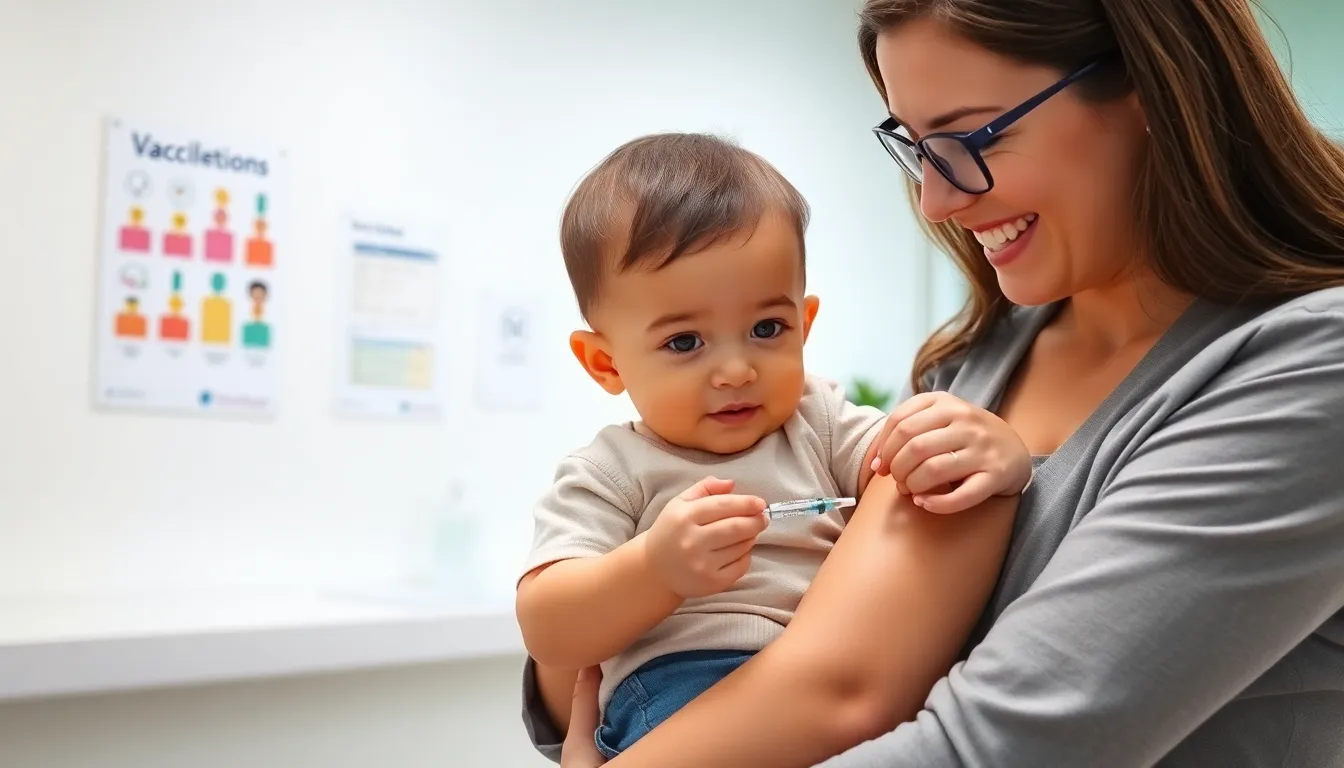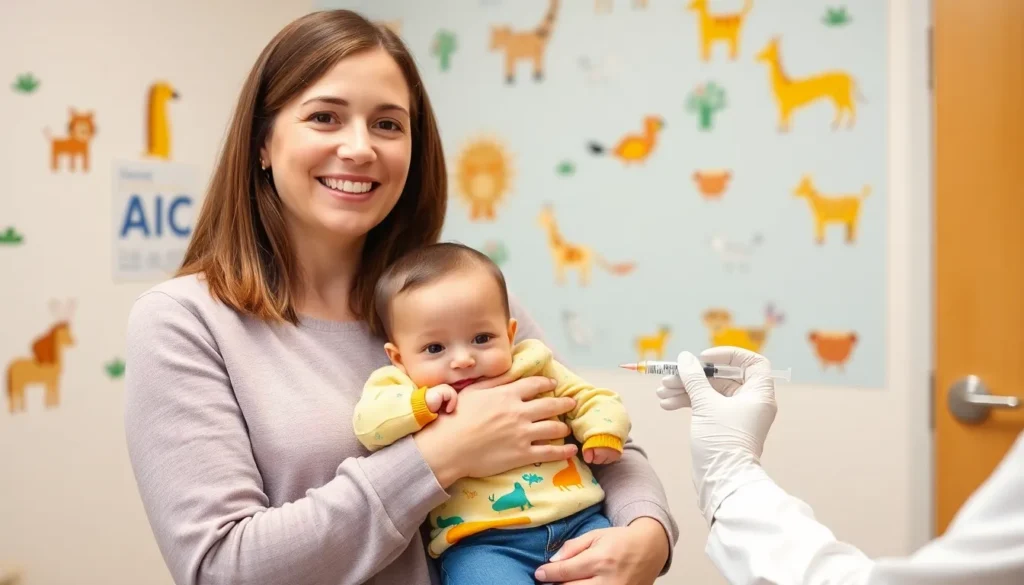When it comes to keeping kids healthy, timing is everything—especially when it involves the measles vaccine. Parents often find themselves juggling schedules, nap times, and snack breaks, but knowing when to get that all-important shot shouldn’t be a guessing game. After all, nobody wants to be the parent who shows up to the party with a child who thinks measles is just a fancy new dance move.
The measles vaccine isn’t just a routine check-up; it’s a superhero cape for your little one, protecting them from a highly contagious virus that’s been known to crash playdates since forever. Understanding the optimal timing for vaccinations can make all the difference in keeping your child safe and sound. So let’s dive into the nitty-gritty of when kids get the measles vaccine and why it’s crucial for their health and happiness.
Table of Contents
ToggleUnderstanding Measles Vaccination
Parents typically administer the measles vaccine at 12 to 15 months of age, according to the Centers for Disease Control and Prevention (CDC). This initial dose provides essential protection against the virus during a child’s first year. The importance of this timing lies in the child’s developing immune system, which benefits from vaccination at this stage.
A second dose follows between ages 4 and 6. This booster helps ensure long-lasting immunity, especially important as children enter school environments where measles can spread rapidly. Most states require proof of vaccination before school entry, further underscoring its significance in a child’s health plan.
Healthcare providers recommend that children receive the measles, mumps, and rubella (MMR) vaccine. Administering this combined vaccine reduces the number of shots children need while offering comprehensive protection against these illnesses. Families should consult healthcare professionals for personalized recommendations, and they can access reliable information online through the CDC or local health departments.
Community immunity, or herd immunity, relies on high vaccination rates. When enough individuals are vaccinated, it reduces the likelihood of outbreaks entering a community. This is especially critical for those who cannot receive vaccines for medical reasons. Keeping up with vaccinations protects not only individual children but also the wider community.
Understanding the timing and importance of the measles vaccine is crucial for ensuring children’s health. Parents are encouraged to maintain open communication with healthcare providers regarding schedules and any concerns they may have about vaccinations.
Vaccine Schedule

Timing for the measles vaccine is vital for protecting children’s health. Understanding the schedule helps ensure children receive the appropriate doses.
Initial Dose
The first dose of the measles vaccine occurs between 12 and 15 months of age. This age range aligns with the development of a child’s immune system, making it an essential time for vaccination. Parents frequently visit healthcare providers during this period to discuss the vaccine and any related concerns. Administration of the measles, mumps, and rubella (MMR) combination vaccine is common at this stage. By getting vaccinated early, children gain initial immunity against a highly contagious virus, which protects them as they begin to explore the world.
Second Dose
A second dose is typically recommended between ages 4 and 6. This timing coincides with children’s entry into school, where exposure to measles can increase significantly. Providing this booster dose reinforces immunity, ensuring longer-lasting protection. Many states require proof of vaccination, making it crucial for parents to stay informed and prepared. By following this schedule, parents contribute to community immunity, reducing the risk of outbreaks that can affect those unable to receive vaccinations for medical reasons. Vaccination records should be regularly updated and checked with healthcare providers to ensure compliance with local health regulations.
Importance of Measles Vaccination
Measles vaccination plays a crucial role in child health. This vaccine protects individuals and communities against a highly contagious virus.
Herd Immunity
Herd immunity occurs when a significant portion of a population is vaccinated, providing indirect protection to unvaccinated individuals. This collective immunity minimizes the spread of measles, safeguarding those unable to receive the vaccine, such as infants and individuals with certain health conditions. Achieving high vaccination rates is critical; experts recommend at least 95% to effectively prevent outbreaks. The presence of measles in communities can lead to rapid transmission in unvaccinated groups, making vaccination essential for public health.
Protecting Vulnerable Populations
Vulnerable populations, including infants and children with medical contraindications, benefit significantly from widespread measles vaccination. Those with weakened immune systems or specific allergies cannot receive the vaccine and rely on the immunity of the surrounding community. Vaccinating children helps protect these individuals from the risk of contracting measles, which can lead to severe complications. Public health initiatives emphasize the need for routine vaccinations to create a robust defense against outbreaks, particularly in schools and community settings where populations interact closely.
Common Concerns and Myths
Parents often express concerns regarding the measles vaccine. Understanding common myths and side effects helps clarify these uncertainties.
Side Effects of the Vaccine
Mild side effects occur after the measles vaccine in some children. Fever, rash, and irritability may appear within one to two weeks post-vaccination. Serious side effects, such as allergic reactions, are rare, occurring in approximately one in a million doses. Healthcare providers emphasize the vaccine’s benefits outweigh the potential risks. Monitoring children’s reactions after vaccination can provide reassurance. Utilizing a vaccine information sheet can help parents recognize what to expect during recovery.
Misconceptions About Measles
Misconceptions about measles often stem from misinformation. One common myth suggests that measles is not severe and mainly affects older children. In reality, measles can cause severe complications, including pneumonia and encephalitis, especially in unimmunized children. Another misconception states that vaccines cause autism. Extensive studies disproving this claim show no causal link between the MMR vaccine and autism. It’s crucial for parents to rely on reputable sources for information regarding vaccines. Understanding facts surrounding measles highlights the need for vaccination.
Timely vaccination against measles is essential for protecting children’s health and preventing outbreaks. By adhering to the recommended schedule of the first dose at 12 to 15 months and the second dose between ages 4 and 6, parents can help ensure their children develop strong immunity. This proactive approach not only safeguards individual health but also contributes to community immunity, benefiting those who cannot be vaccinated. Maintaining open communication with healthcare providers and staying informed about vaccination schedules can empower parents to make the best choices for their children’s well-being. Prioritizing measles vaccination is a crucial step toward fostering a healthier future for children and communities alike.





